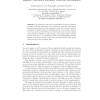Free Online Productivity Tools
i2Speak
i2Symbol
i2OCR
iTex2Img
iWeb2Print
iWeb2Shot
i2Type
iPdf2Split
iPdf2Merge
i2Bopomofo
i2Arabic
i2Style
i2Image
i2PDF
iLatex2Rtf
Sci2ools
109
click to vote
ICANN
2005
Springer
2005
Springer
Implicit Relevance Feedback from Eye Movements
We explore the use of eye movements as a source of implicit relevance feedback information. We construct a controlled information retrieval experiment where the relevance of each text is known, and test usefulness of implicit relevance feedback with it. If perceived relevance of a text can be predicted from eye movements, eye movement signal must contain information on the relevance. The result is that relevance can be predicted to a considerable extent with discriminative hidden Markov models, and clearly better than randomly already with simple linear models of time-averaged data.
Related Content
| Added | 27 Jun 2010 |
| Updated | 27 Jun 2010 |
| Type | Conference |
| Year | 2005 |
| Where | ICANN |
| Authors | Jarkko Salojärvi, Kai Puolamäki, Samuel Kaski |
Comments (0)

